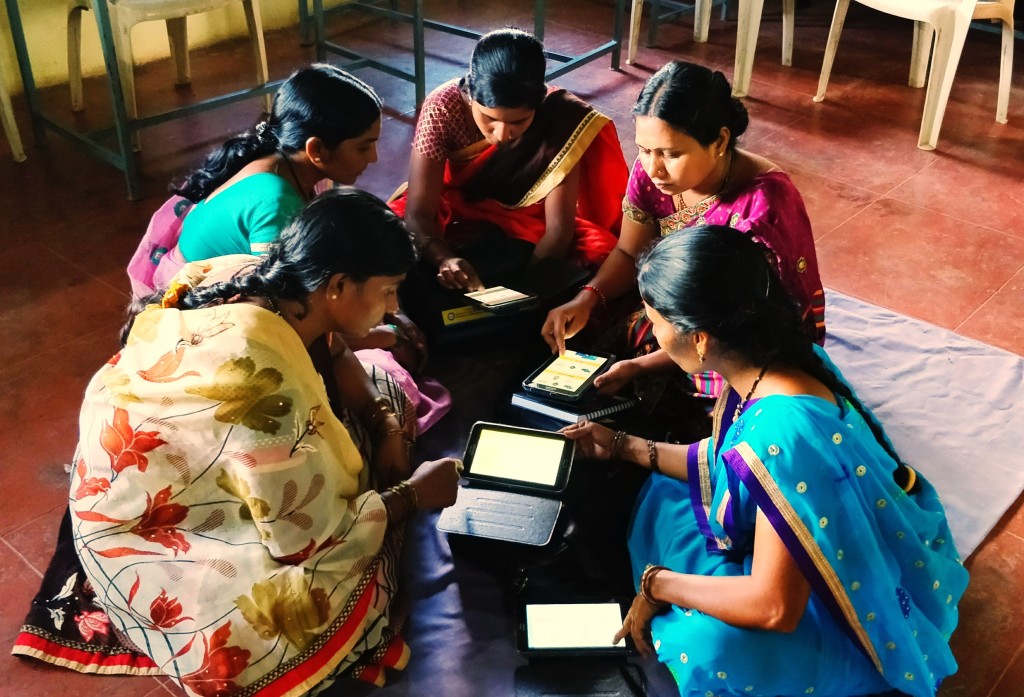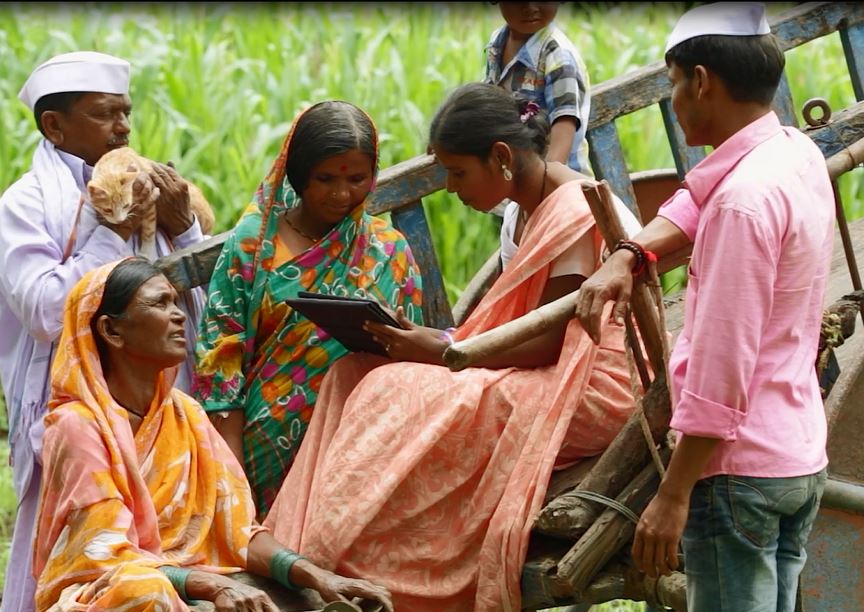Equipped with a tablet each, these Digital Sakhis confidently ensure door-to-door dissemination of information—from daily transactions using digital modes of payments to updates about government policies and schemes—across their demarcated villages on a regular basis.
Digital transactions and a ‘cashless’ economy are all the rage currently. Such a shift has been easier in the urban parts of the country, thanks to better access to smartphones and the Internet.
The same hasn’t been the case with people living in villages and lesser developed towns.
“Most people here had smartphones but they would only use it for entertainment purposes. While the government has made almost all our public policies and schemes as well as banking facilities accessible through smartphones, people in villages are still not aware and spend hours in queues at government offices,” says Dipali Karekar.
There is also the problem of phone ownership and familiarity with the devices. “This is the story of most households in our community, where it is often the breadwinner who has a phone and uses it, while the rest continue to remain uninitiated,” explains Lakshmi Mahavir Patil.
But this shortcoming is now being addressed, thanks to many unique initiatives, with many organisations and grassroots interventions at the forefront of the transformation.
Take Dipali and Lakshmi. They are both ‘Digital Sakhis’, and the initiative has not only transformed their lives but also the communities of some 30 villages so far!
Who are Digital Sakhis and What is the Digital Sakhi Programme?
In 2017, L&T Financial Services (LTFS), pioneered this programme in collaboration with Action for Agricultural Renewal in Maharashtra (AFARM), a non-profit organisation. The programme is now changing the lives of countless rural women, and as a result, communities as a whole.
The programme was conceived based on the findings of Baseline and Needs Assessment (BAN), a scientific study conducted by LTFS and AFARM across the districts of Pune, Osmanabad and Solapur in Maharashtra to ascertain the socio-economic indicators, existing infrastructure and the prevalent practices of the communities.
Based on this assessment, the districts fared quite poorly on human development indicators like education levels, income levels and women empowerment. Other than this, it was also found that most women from these areas lacked any kind of contribution in household financial decision making. This was despite the fact that most women are actively involved in income generation activities.
LTFS put together the Digital Sakhi programme with the underlying focus on working towards the fifth Sustainable Development Goal (SDG)—to achieve gender equality and empower all women and girls..
100 women functionaries were identified from these same villages, who were trained extensively in areas like digital financial literacy, leadership and technology.
Equipped with a tablet each that comes with preloaded Digital Financial Literacy (DFL) modules, these 100 Sakhis confidently ensure door-to-door dissemination of information—from daily transactions using digital modes of payments to updates about government policies and schemes—across their demarcated villages on a regular basis.
The ‘Digital Sakhi’ programme has another leg as a part of which 1,000 women entrepreneurs practising goat rearing, poultry, dairy and tailoring are chosen and up-skilled in their respective trades to yield better produce.
These women entrepreneurs are also meticulously trained in enterprise development wherein they are taught to collaboratively develop market linkages and ascertain higher bargaining rights. Simultaneously, these 1000 women entrepreneurs are trained to perform their business transactions digitally by the 100 Digital Sakhis.
Each Sakhi is responsible for training 1,100 citizens and through their training, they have helped the rural population, who were once digitally oblivious, to embrace technology and optimally utilise its benefits.
The programme has helped empower the Sakhis as well.
A resident of Pande village, Sheetal Namdev Shivsagar donned the role of a Digital Sakhi last year in June, after learning about the programme through a local non-profit organisation in her village.
However, when it came to crucial decision-making in her family life, she wasn’t really included in the discussions and was rarely consulted by her husband in these matters.
“Following my association with the Digital Sakhi programme, not only did my shyness and social awkwardness phase out, I also managed to earn a respectable position in the eyes of both the society as well as my family, which now began to infer with me before every decision making. The initiative had been a turning point in my life, which helped raise my confidence as well as my ability for public interaction,” says the 29-year-old.
Sheetal also shares that following her visits to households under her responsibility, many women approached her to learn more about the programme and how her confidence inspired them too.
It was not always so easy. Women like Lakshmi had a much tougher time.
The 32-year-old had a tough time convincing not just her husband but also her in-laws – which went on for few days before she emerged triumphantly, and became a Digital Sakhi last year in June.
“Today, I’m better equipped with digital transactions as well as bank formalities that are just a click away and I’m happy that I’m able to empower women like me, who in turn educate the men in their households and together we are helping the rural side to become digitally literate,” she adds.
The programme, which originally aimed to empower rural women has slowly transcended over to a greater goal, i.e. enabling and equipping entire communities who are now putting their smartphones to better purposes.
The future is coming to our villages, and thankfully there are ‘Sakhis’ to give it a warm welcome.
(Edited by Vinayak Hegde)
Article Source: The Better India


